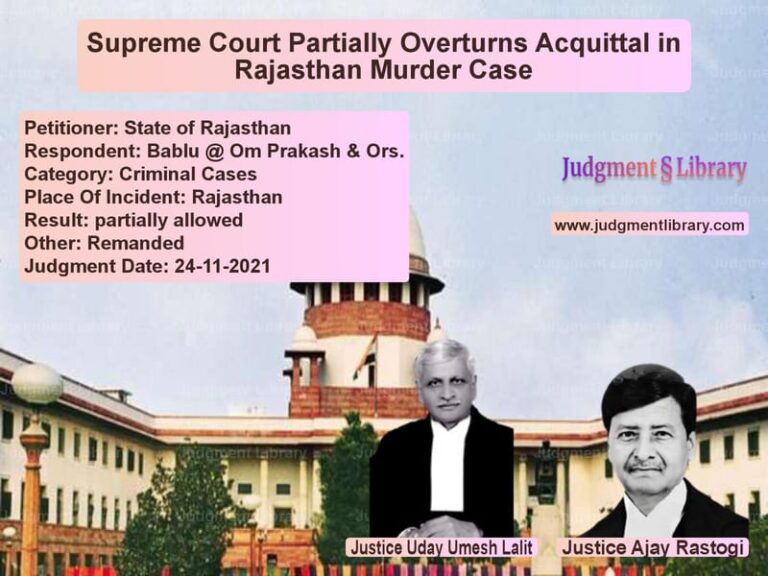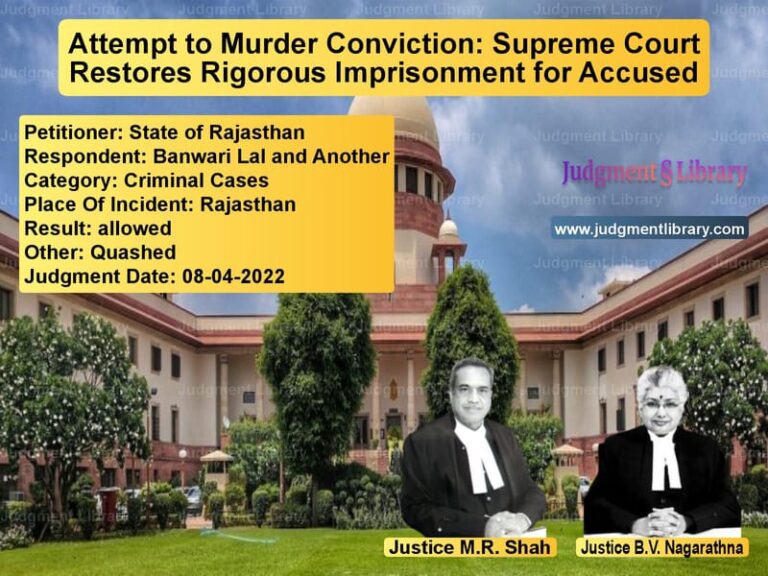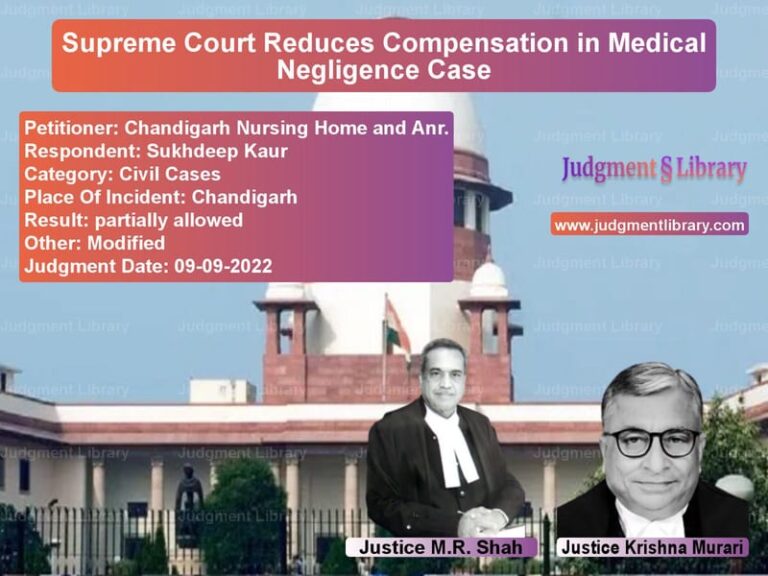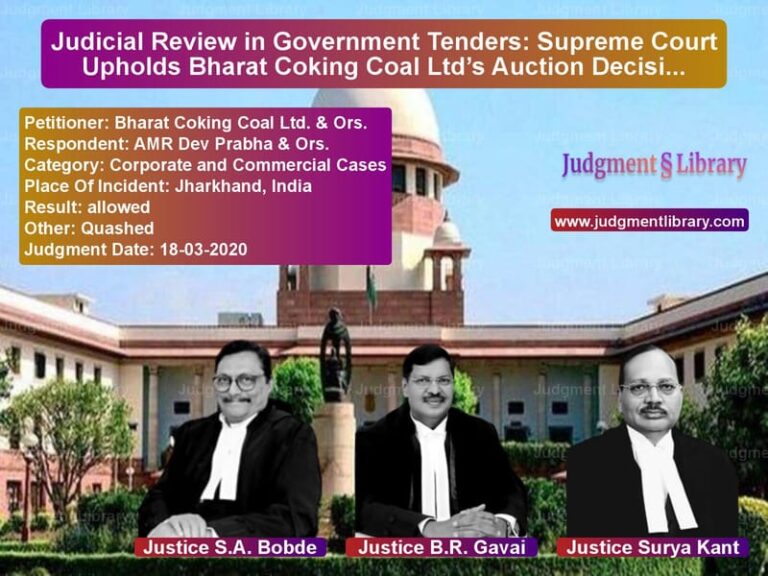Sukhbiri Devi & Ors. v. Union of India: Legal Precedents on Limitation and Relinquishment Deed in Land Allotment Disputes
The case of Sukhbiri Devi & Ors. versus the Union of India & Ors. is a significant one involving questions related to the limitation period for filing a suit in land disputes, particularly concerning the relinquishment deed and the allotment of an alternative plot of land. The appeal was filed by the appellants against the judgment and order passed by the High Court of Delhi, where the courts below dismissed their claim. The primary issue at stake was whether the suit filed by the appellants was barred by limitation, given the facts surrounding the relinquishment deed and the subsequent actions of the involved parties.
The background of the dispute can be traced back to 1976 when land belonging to Shri Rama Nand, the predecessor-in-interest of the appellants, was acquired for public purposes by the government. The appellants’ father, Shri Rama Nand, was the bhumidar (landholder) of the acquired land, and under the policy for land acquisition, he was entitled to the allotment of an alternative residential plot in lieu of the acquired agricultural land. The government issued a letter on March 8, 1991, to the relevant authorities for the allotment of the alternative plot in the name of Dhan Singh, based on a Relinquishment Deed executed by the other legal heirs of Shri Rama Nand in his favor. The appellants, however, disputed the validity of this deed, claiming that it had been obtained fraudulently.
Upon learning about the relinquishment deed, the appellants filed objections to the allotment of the alternative plot exclusively in Dhan Singh’s name. The appellants alleged that Dhan Singh had played fraud in obtaining the relinquishment deed. However, despite the objections and several representations made by the appellants, the land was allotted solely to Dhan Singh. As a result, the appellants instituted a suit in 2000 seeking a declaratory relief that they were the rightful co-owners of the allotted plot and that Dhan Singh should not be the exclusive owner.
The core legal issue was whether the suit was barred by limitation. The appellants argued that the suit was not barred by the limitation period because they became aware of the fraudulent nature of the relinquishment deed only in March 1991. The appellants contended that they were entitled to file the suit within three years from the date they became aware of the fraud. On the other hand, the respondent, Dhan Singh, argued that the suit was filed too late, as the relinquishment deed was executed much earlier, and the appellants should have initiated the suit within the prescribed time limit. The respondent further argued that the appellants had failed to take timely action to challenge the deed in the civil court.
The trial court dismissed the suit, ruling that the appellants’ claim was barred by the limitation period. The court held that the appellants had knowledge of the relinquishment deed at least by March 1991, and the suit should have been filed within three years of that date. The appellants’ failure to challenge the relinquishment deed within the statutory period led the trial court to reject the claim. The first appellate court upheld the trial court’s decision, and the High Court also concurred with the findings, leading to the current appeal before the Supreme Court.
The appellants raised several points in the appeal, asserting that the courts below had wrongly dismissed the suit on the ground of limitation. They argued that the issue of limitation should have been determined by the court after considering the facts, as they were not aware of the fraud until 1991. The appellants’ counsel argued that the limitation period should be extended based on the nature of the case, particularly because the cause of action only arose when they became aware of the fraud.
The respondent’s counsel, on the other hand, maintained that the appellants were aware of the relinquishment deed earlier, and that the delay in challenging the deed was unreasonable. The respondent emphasized that the relinquishment deed had been executed long before the appellants filed their objections and that the appellants should have taken timely legal action. According to the respondent, the courts below had correctly determined the limitation issue and dismissed the suit accordingly.
Read also: https://judgmentlibrary.com/fair-price-shop-license-dispute-a-legal-analysis-of-the-ram-kumar-case/
The Supreme Court, in reviewing the case, considered the legal precedents on limitation, specifically in cases involving fraud. The Court referred to the ruling in the case of C. Natarajan v. Ashim Bai & Anr. and Popat And Kotecha Property v. State Bank of India Staff Association, among others, to analyze the applicability of the limitation period in cases involving fraudulent actions. The Court noted that the time period for challenging a relinquishment deed based on fraud begins when the party claiming fraud becomes aware of it. The Court emphasized that the appellants had sufficient time to challenge the deed after learning of the fraud in 1991.
After examining the pleadings, the documents, and the legal arguments, the Supreme Court ruled in favor of the respondents, dismissing the appeal. The Court held that the suit was indeed barred by limitation, as the appellants had failed to challenge the relinquishment deed within the prescribed period. The Court emphasized the importance of timely action in legal matters, particularly when it comes to issues of property rights and land allotments. The appellants’ failure to seek appropriate remedies within the limitation period rendered their suit untenable.
The judgment in this case serves as an important reminder of the strict application of limitation periods in property disputes and the need for parties to act promptly when challenging documents like relinquishment deeds. It also highlights the need for courts to carefully consider the factual context and legal precedents when determining the applicability of limitation laws, especially in cases involving fraud and deceit.
Petitioner Name: Sukhbiri Devi & Ors..Respondent Name: Union of India & Ors..Judgment By: Justice Ajay Rastogi, Justice C.T. Ravikumar.Place Of Incident: Delhi.Judgment Date: 29-09-2022.
Don’t miss out on the full details! Download the complete judgment in PDF format below and gain valuable insights instantly!
Download Judgment: sukhbiri-devi-&-ors.-vs-union-of-india-&-ors-supreme-court-of-india-judgment-dated-29-09-2022.pdf
Directly Download Judgment: Directly download this Judgment
See all petitions in Contract Disputes
See all petitions in Property Disputes
See all petitions in Succession and Wills
See all petitions in Specific Performance
See all petitions in Damages and Compensation
See all petitions in Judgment by Ajay Rastogi
See all petitions in Judgment by C.T. Ravikumar
See all petitions in dismissed
See all petitions in supreme court of India judgments September 2022
See all petitions in 2022 judgments
See all posts in Civil Cases Category
See all allowed petitions in Civil Cases Category
See all Dismissed petitions in Civil Cases Category
See all partially allowed petitions in Civil Cases Category







